人教新目标版英语七年级下Unit 7 It's raining!Section A 1a-2d知识点串讲课件(15张PPT)
文档属性
| 名称 | 人教新目标版英语七年级下Unit 7 It's raining!Section A 1a-2d知识点串讲课件(15张PPT) | 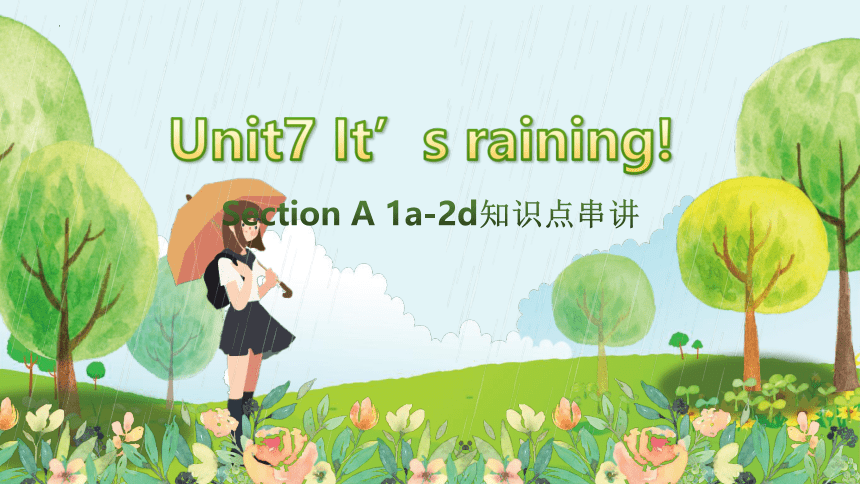 | |
| 格式 | pptx | ||
| 文件大小 | 4.7MB | ||
| 资源类型 | 教案 | ||
| 版本资源 | 人教新目标(Go for it)版 | ||
| 科目 | 英语 | ||
| 更新时间 | 2022-04-15 23:44:57 | ||
图片预览

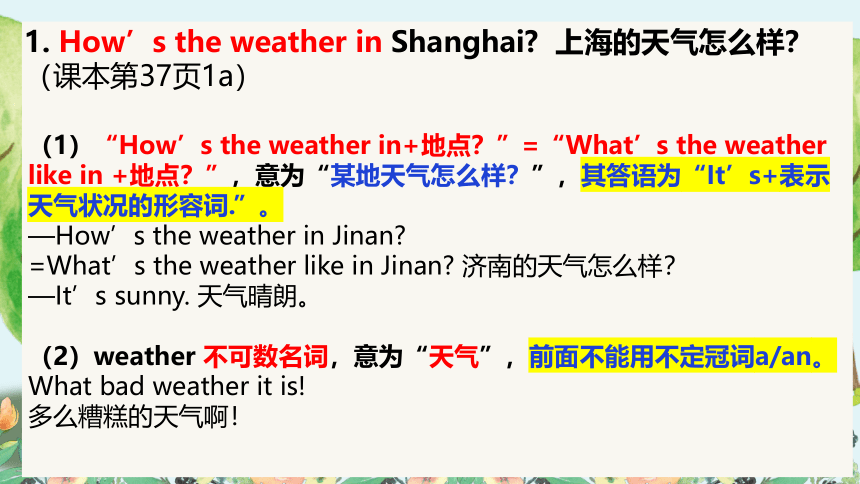
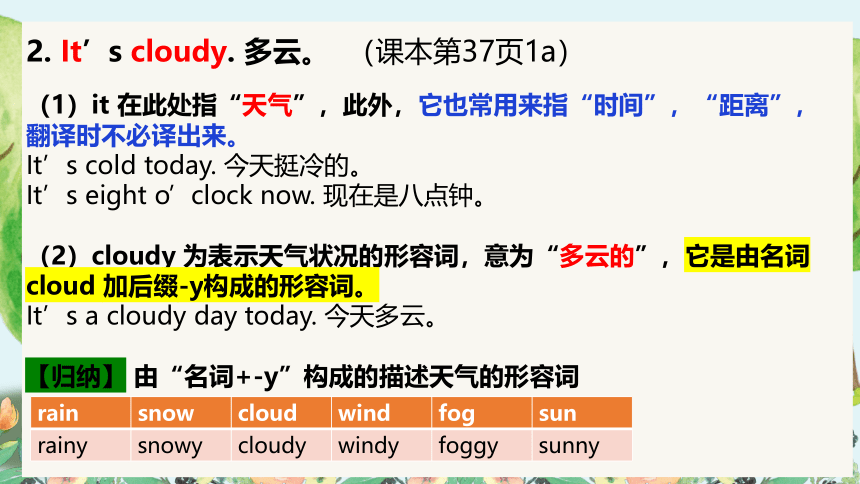
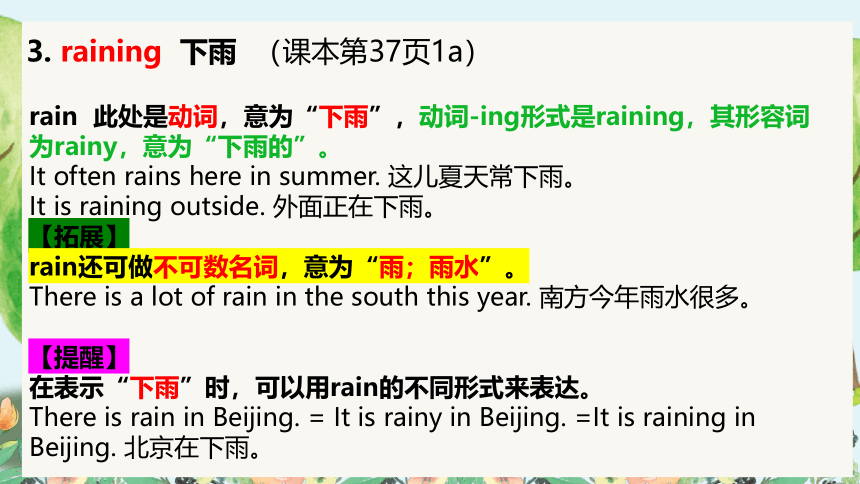
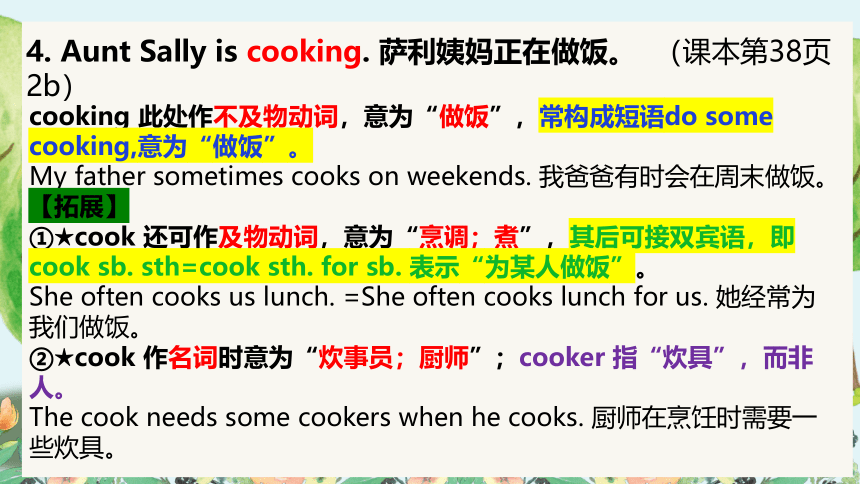
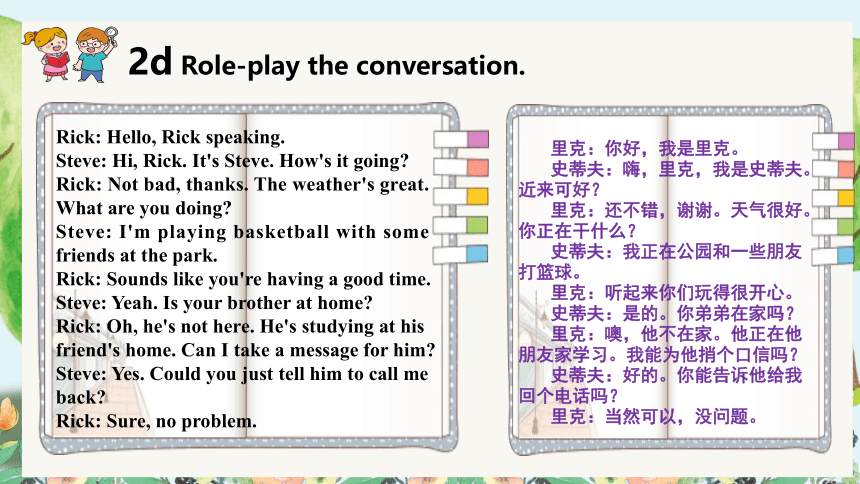
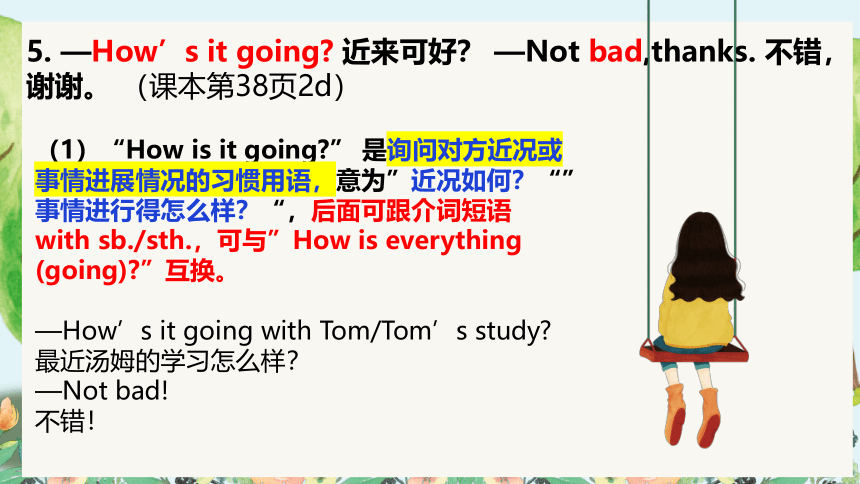
文档简介
(共15张PPT)
Unit7 It’s raining!
Section A 1a-2d知识点串讲
1. How’s the weather in Shanghai 上海的天气怎么样? (课本第37页1a)
(1)“How’s the weather in+地点?”=“What’s the weather like in +地点?”,意为“某地天气怎么样?”,其答语为“It’s+表示天气状况的形容词.”。
—How’s the weather in Jinan
=What’s the weather like in Jinan 济南的天气怎么样?
—It’s sunny. 天气晴朗。
(2)weather 不可数名词,意为“天气”,前面不能用不定冠词a/an。
What bad weather it is!
多么糟糕的天气啊!
2. It’s cloudy. 多云。 (课本第37页1a)
(1)it 在此处指“天气”,此外,它也常用来指“时间”,“距离”,翻译时不必译出来。
It’s cold today. 今天挺冷的。
It’s eight o’clock now. 现在是八点钟。
(2)cloudy 为表示天气状况的形容词,意为“多云的”,它是由名词cloud 加后缀-y构成的形容词。
It’s a cloudy day today. 今天多云。
【归纳】 由“名词+-y”构成的描述天气的形容词
rain snow cloud wind fog sun
rainy snowy cloudy windy foggy sunny
3. raining 下雨 (课本第37页1a)
rain 此处是动词,意为“下雨”,动词-ing形式是raining,其形容词为rainy,意为“下雨的”。
It often rains here in summer. 这儿夏天常下雨。
It is raining outside. 外面正在下雨。
【拓展】
rain还可做不可数名词,意为“雨;雨水”。
There is a lot of rain in the south this year. 南方今年雨水很多。
【提醒】
在表示“下雨”时,可以用rain的不同形式来表达。
There is rain in Beijing. = It is rainy in Beijing. =It is raining in Beijing. 北京在下雨。
4. Aunt Sally is cooking. 萨利姨妈正在做饭。 (课本第38页2b)
cooking 此处作不及物动词,意为“做饭”,常构成短语do some cooking,意为“做饭”。
My father sometimes cooks on weekends. 我爸爸有时会在周末做饭。
【拓展】
①★cook 还可作及物动词,意为“烹调;煮”,其后可接双宾语,即cook sb. sth=cook sth. for sb. 表示“为某人做饭”。
She often cooks us lunch. =She often cooks lunch for us. 她经常为我们做饭。
②★cook 作名词时意为“炊事员;厨师”;cooker 指“炊具”,而非人。
The cook needs some cookers when he cooks. 厨师在烹饪时需要一些炊具。
2d Role-play the conversation.
Rick: Hello, Rick speaking.
Steve: Hi, Rick. It's Steve. How's it going
Rick: Not bad, thanks. The weather's great. What are you doing
Steve: I'm playing basketball with some friends at the park.
Rick: Sounds like you're having a good time.
Steve: Yeah. Is your brother at home
Rick: Oh, he's not here. He's studying at his friend's home. Can I take a message for him
Steve: Yes. Could you just tell him to call me back
Rick: Sure, no problem.
里克:你好,我是里克。
史蒂夫:嗨,里克,我是史蒂夫。近来可好?
里克:还不错,谢谢。天气很好。你正在干什么?
史蒂夫:我正在公园和一些朋友打篮球。
里克:听起来你们玩得很开心。
史蒂夫:是的。你弟弟在家吗?
里克:噢,他不在家。他正在他朋友家学习。我能为他捎个口信吗?
史蒂夫:好的。你能告诉他给我回个电话吗?
里克:当然可以,没问题。
5. —How’s it going 近来可好? —Not bad,thanks. 不错,谢谢。 (课本第38页2d)
(1)“How is it going ” 是询问对方近况或事情进展情况的习惯用语,意为”近况如何?“”事情进行得怎么样?“,后面可跟介词短语with sb./sth.,可与”How is everything (going) ”互换。
—How’s it going with Tom/Tom’s study 最近汤姆的学习怎么样?
—Not bad!
不错!
【拓展】
该句型的常见答语有:
(2)bad 形容词,意为“坏的,糟的”。
be bad for 意为“对...有坏处”。
Watching too much TV is bad for your eyes. 看太多的电视对你的眼睛有害。
Pretty good! 相当不错!
Great! 很好!
Not bad! 不错!
Just so-so. 一般般。
Terrible!太糟糕了!
Everything is going well! 一切进展顺利!
6. Sounds like you’re having a good time. 听起来好像你玩得很开心。 (课本第38页2d)
(1)本句是一个省略句,完整的句子应该是“It sounds like...”. sound like 意为”听起来好像“,后面常接名词或从句。
It sounds like a lot of fun. 听起来好像很好玩。
It sounds like someone is laughing next door. 听起来好像隔壁有人在笑。
(2)have a good time 意为“玩得高兴;过得愉快”,同义短语为enjoy oneself/have fun 等。
—I’m going to Qingdao to spend my summer holiday with my parents. 我要和父母一起去青岛过暑假。
—Have a good time! 祝你们玩得高兴!
7. Can I take a message for him 要不我给他捎个话? (课本第38页2d)
message 可数名词,意为“(书面或口头的)消息,信息”。 常用短语如下:
She is not at home. Please take a message for her. 她不在家。请给她捎个口信。
Can I leave a message for her 我可以给他留言吗?
I will give her a message.= I will give a message to her. 我将给她捎个口信。
take a message leave a message for sb. give sb. a message
给....捎口信;传话给... 给某人留言 捎口信给某人,相当于give a message to sb.
8. Could you just tell him to call me back 你能否叫他给我回个电话? (课本第38页2d)
(1)could 情态动词,意为“能;可以”,表示请求或许可,语气比can委婉。其答语不用could用can。
—Could I have the television on 我可以打开电视吗?
—Yes,you can./No,you can’t. 是的,你可以。/ 不,你不可以。
【拓展】
“Could you please... ”意为”你能......吗?“,是一个表示请求的句型。 其肯定答语为”Sure./ Certainly./Of course./With pleasure.”等,否定回答为”Sorry,I can’t.I....”。
—Could you please go to the movies with me 你可以和我一起去看电影吗?
—Sorry,I can’t. I have to do my homework. 对不起,我不能去。我得做我的家庭作业。
(2)tel sb. (not) to do sth. 意为“告诉某人(不)做某事”。
Tell him not to open the box. 告诉他别打开这个箱子。
(3)back 作副词,意为“回来;回原处”。 call sb. back 意为“给某人回电话”。
【拓展】
①★back的其他词性:
a. 作名词,意为“背部;后面;后部”。
b.做形容词,意为“后面的”。
He hit me on the back. 他打了我后背一下。
He sat in the back seat of the car. 他坐在汽车后座上。
②★back的相关短语
get back 取回;返回
give back 归还
take back 收回
think back 回想
come back 回来
look back 回顾
9. Sure, no problem. 当然可以,没问题。 (课本第38页2d)
(1)no problem 用来表示同意或愉快地答应请求,意为“没问题;小事一桩”。
—Could you post the letter for me 你能帮我邮寄这封信吗?
—No problem. 没问题。
(2)problem 名词,意为“困难;难题”。
【辨析】 problem 与 question
problem “困难”,相当于difficulty,尤指难以解决的问题或数学、物理习题,常与solve/work out搭配。
question “问题”,指说话者需要寻找答案的问题,常与ask或answer搭配。
10. What’s John doing doing right now 此刻约翰正在做什么? (课本第39页3a)
right away 意为“此刻;现在”,相当于now, 常与现在进行时连用。
Bill is watching TV right now. 比尔此刻正在看电视。
【拓展】
right away 还可意为“立即;马上”,此时通常和一般将来时连用,相当于right away。
I‘ll do it right now. 我马上做。
I’m coming right now. 我马上来。
Thank you for watching!
Unit7 It’s raining!
Section A 1a-2d知识点串讲
1. How’s the weather in Shanghai 上海的天气怎么样? (课本第37页1a)
(1)“How’s the weather in+地点?”=“What’s the weather like in +地点?”,意为“某地天气怎么样?”,其答语为“It’s+表示天气状况的形容词.”。
—How’s the weather in Jinan
=What’s the weather like in Jinan 济南的天气怎么样?
—It’s sunny. 天气晴朗。
(2)weather 不可数名词,意为“天气”,前面不能用不定冠词a/an。
What bad weather it is!
多么糟糕的天气啊!
2. It’s cloudy. 多云。 (课本第37页1a)
(1)it 在此处指“天气”,此外,它也常用来指“时间”,“距离”,翻译时不必译出来。
It’s cold today. 今天挺冷的。
It’s eight o’clock now. 现在是八点钟。
(2)cloudy 为表示天气状况的形容词,意为“多云的”,它是由名词cloud 加后缀-y构成的形容词。
It’s a cloudy day today. 今天多云。
【归纳】 由“名词+-y”构成的描述天气的形容词
rain snow cloud wind fog sun
rainy snowy cloudy windy foggy sunny
3. raining 下雨 (课本第37页1a)
rain 此处是动词,意为“下雨”,动词-ing形式是raining,其形容词为rainy,意为“下雨的”。
It often rains here in summer. 这儿夏天常下雨。
It is raining outside. 外面正在下雨。
【拓展】
rain还可做不可数名词,意为“雨;雨水”。
There is a lot of rain in the south this year. 南方今年雨水很多。
【提醒】
在表示“下雨”时,可以用rain的不同形式来表达。
There is rain in Beijing. = It is rainy in Beijing. =It is raining in Beijing. 北京在下雨。
4. Aunt Sally is cooking. 萨利姨妈正在做饭。 (课本第38页2b)
cooking 此处作不及物动词,意为“做饭”,常构成短语do some cooking,意为“做饭”。
My father sometimes cooks on weekends. 我爸爸有时会在周末做饭。
【拓展】
①★cook 还可作及物动词,意为“烹调;煮”,其后可接双宾语,即cook sb. sth=cook sth. for sb. 表示“为某人做饭”。
She often cooks us lunch. =She often cooks lunch for us. 她经常为我们做饭。
②★cook 作名词时意为“炊事员;厨师”;cooker 指“炊具”,而非人。
The cook needs some cookers when he cooks. 厨师在烹饪时需要一些炊具。
2d Role-play the conversation.
Rick: Hello, Rick speaking.
Steve: Hi, Rick. It's Steve. How's it going
Rick: Not bad, thanks. The weather's great. What are you doing
Steve: I'm playing basketball with some friends at the park.
Rick: Sounds like you're having a good time.
Steve: Yeah. Is your brother at home
Rick: Oh, he's not here. He's studying at his friend's home. Can I take a message for him
Steve: Yes. Could you just tell him to call me back
Rick: Sure, no problem.
里克:你好,我是里克。
史蒂夫:嗨,里克,我是史蒂夫。近来可好?
里克:还不错,谢谢。天气很好。你正在干什么?
史蒂夫:我正在公园和一些朋友打篮球。
里克:听起来你们玩得很开心。
史蒂夫:是的。你弟弟在家吗?
里克:噢,他不在家。他正在他朋友家学习。我能为他捎个口信吗?
史蒂夫:好的。你能告诉他给我回个电话吗?
里克:当然可以,没问题。
5. —How’s it going 近来可好? —Not bad,thanks. 不错,谢谢。 (课本第38页2d)
(1)“How is it going ” 是询问对方近况或事情进展情况的习惯用语,意为”近况如何?“”事情进行得怎么样?“,后面可跟介词短语with sb./sth.,可与”How is everything (going) ”互换。
—How’s it going with Tom/Tom’s study 最近汤姆的学习怎么样?
—Not bad!
不错!
【拓展】
该句型的常见答语有:
(2)bad 形容词,意为“坏的,糟的”。
be bad for 意为“对...有坏处”。
Watching too much TV is bad for your eyes. 看太多的电视对你的眼睛有害。
Pretty good! 相当不错!
Great! 很好!
Not bad! 不错!
Just so-so. 一般般。
Terrible!太糟糕了!
Everything is going well! 一切进展顺利!
6. Sounds like you’re having a good time. 听起来好像你玩得很开心。 (课本第38页2d)
(1)本句是一个省略句,完整的句子应该是“It sounds like...”. sound like 意为”听起来好像“,后面常接名词或从句。
It sounds like a lot of fun. 听起来好像很好玩。
It sounds like someone is laughing next door. 听起来好像隔壁有人在笑。
(2)have a good time 意为“玩得高兴;过得愉快”,同义短语为enjoy oneself/have fun 等。
—I’m going to Qingdao to spend my summer holiday with my parents. 我要和父母一起去青岛过暑假。
—Have a good time! 祝你们玩得高兴!
7. Can I take a message for him 要不我给他捎个话? (课本第38页2d)
message 可数名词,意为“(书面或口头的)消息,信息”。 常用短语如下:
She is not at home. Please take a message for her. 她不在家。请给她捎个口信。
Can I leave a message for her 我可以给他留言吗?
I will give her a message.= I will give a message to her. 我将给她捎个口信。
take a message leave a message for sb. give sb. a message
给....捎口信;传话给... 给某人留言 捎口信给某人,相当于give a message to sb.
8. Could you just tell him to call me back 你能否叫他给我回个电话? (课本第38页2d)
(1)could 情态动词,意为“能;可以”,表示请求或许可,语气比can委婉。其答语不用could用can。
—Could I have the television on 我可以打开电视吗?
—Yes,you can./No,you can’t. 是的,你可以。/ 不,你不可以。
【拓展】
“Could you please... ”意为”你能......吗?“,是一个表示请求的句型。 其肯定答语为”Sure./ Certainly./Of course./With pleasure.”等,否定回答为”Sorry,I can’t.I....”。
—Could you please go to the movies with me 你可以和我一起去看电影吗?
—Sorry,I can’t. I have to do my homework. 对不起,我不能去。我得做我的家庭作业。
(2)tel sb. (not) to do sth. 意为“告诉某人(不)做某事”。
Tell him not to open the box. 告诉他别打开这个箱子。
(3)back 作副词,意为“回来;回原处”。 call sb. back 意为“给某人回电话”。
【拓展】
①★back的其他词性:
a. 作名词,意为“背部;后面;后部”。
b.做形容词,意为“后面的”。
He hit me on the back. 他打了我后背一下。
He sat in the back seat of the car. 他坐在汽车后座上。
②★back的相关短语
get back 取回;返回
give back 归还
take back 收回
think back 回想
come back 回来
look back 回顾
9. Sure, no problem. 当然可以,没问题。 (课本第38页2d)
(1)no problem 用来表示同意或愉快地答应请求,意为“没问题;小事一桩”。
—Could you post the letter for me 你能帮我邮寄这封信吗?
—No problem. 没问题。
(2)problem 名词,意为“困难;难题”。
【辨析】 problem 与 question
problem “困难”,相当于difficulty,尤指难以解决的问题或数学、物理习题,常与solve/work out搭配。
question “问题”,指说话者需要寻找答案的问题,常与ask或answer搭配。
10. What’s John doing doing right now 此刻约翰正在做什么? (课本第39页3a)
right away 意为“此刻;现在”,相当于now, 常与现在进行时连用。
Bill is watching TV right now. 比尔此刻正在看电视。
【拓展】
right away 还可意为“立即;马上”,此时通常和一般将来时连用,相当于right away。
I‘ll do it right now. 我马上做。
I’m coming right now. 我马上来。
Thank you for watching!
同课章节目录
- Unit 1 Can you play the guitar?
- Section A
- Section B
- Unit 2 What time do you go to school?
- Section A
- Section B
- Unit 3 How do you get to school?
- Section A
- Section B
- Unit 4 Don't eat in class.
- Section A
- Section B
- Unit 5 Why do you like pandas?
- Section A
- Section B
- Unit 6 I'm watching TV.
- Section A
- Section B
- Review of Units 1-6
- Unit 7 It's raining!
- Section A
- Section B
- Unit 8 Is there a post office near here?
- Section A
- Section B
- Unit 9 What does he look like?
- Section A
- Section B
- Unit 10 I'd like some noodles.
- Section A
- Section B
- Unit 11 How was your school trip?
- Section A
- Section B
- Unit 12 What did you do last weekend?
- Section A
- Section B
